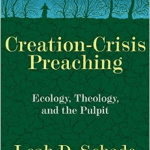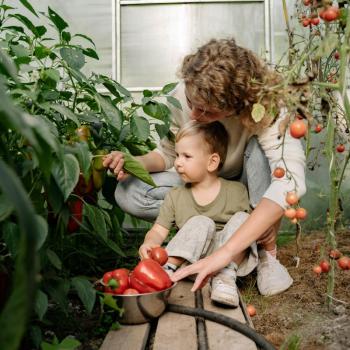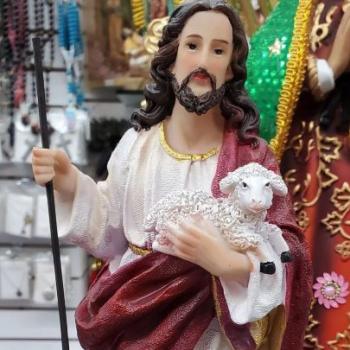The well-being of children and the well-being of God’s Creation are fundamentally linked. Here are 4 things you can do to welcome children into God’s Creation.
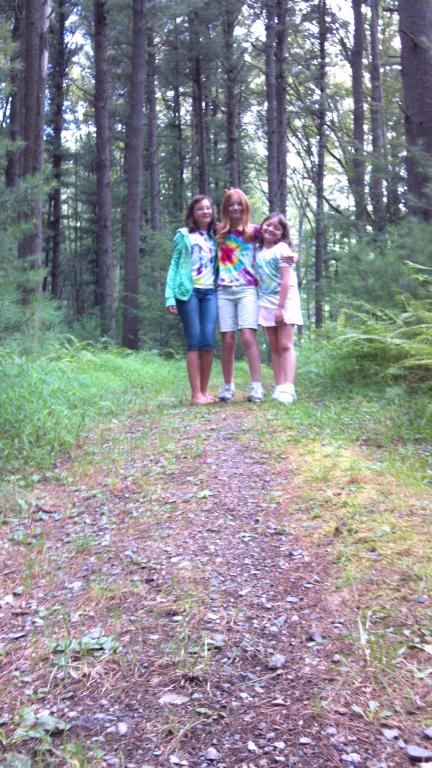
Scripture readings: Jeremiah 11:18-20; Mark 9:30-37
“Jesus loves the little children” is a favorite Sunday School song that conveys the truth about the special care Jesus directs toward children. Just in the Gospel of Mark alone, children have a prominent place in 5 different stories. Why do you think this gospel focuses so much on children? Well, let’s think about children for a few moments. What do we know about kids?
At birth they are helpless. In many societies, they are without status. They are vulnerable, and in many countries, they suffer a high mortality rate.
But this is not to say children have no power.
Though they may have a small view of the world, they’ve got big imaginations! Children are inquisitive and curious. They know nothing but have everything to learn. They crave affection and love to be held and cuddled. They long for the freedom to explore without fear.
So why does Jesus care so much about us welcoming children? Certainly, all these reasons listed above are true. But there’s another reason.
Jesus says that when we welcome children in his name, we are actually welcoming God into our midst.
Remember Jesus is all about having God’s kingdom established on earth. And God’s kingdom is all about caring for those most vulnerable. They say you can tell a lot about a society by the way they treat their oldest and youngest members. So if we are like the disciples – so concerned with who is the greatest that we ignore the needs of our children – then we are not following God’s will.
And I would add that it’s not just how we treat the most vulnerable in the human society that reveals our values. It’s also how we treat the most vulnerable in God’s Creation. How we treat fragile ecosystems, how we treat God’s Earth in general, says a lot about how we treat our fellow humanity. For example, if we look at a beautiful forested mountain, and only value it for the coal or gas or oil beneath its surface, and are willing to sacrifice it for our short-term needs, then we are, in fact, not following God’s will for ourselves or our children.
The well-being of children and the well-being of God’s Creation are fundamentally linked.
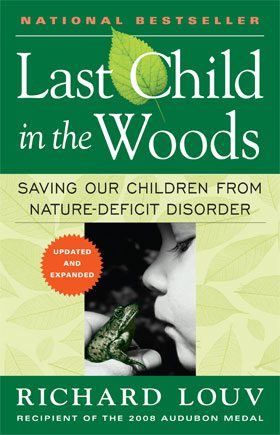 There’s a book I love called The Last Child in the Woods by child advocacy expert Richard Louv. He writes about “nature deficit disorder,” where he directly links the lack of nature in the lives of today’s children to some of the most disturbing childhood trends, such as the rises in obesity, attention disorders, and depression. We keep kids inside, wired to their computers and televisions, which not only deprives children of important relationships with nature, but will result in generations of humans who have no interest in protecting or caring for God’s creation. This is because “children will not save what they do not love,” he writes. And so he encourages giving children direct exposure to nature because it’s essential for healthy childhood development and for the physical and emotional health of children and adults.
There’s a book I love called The Last Child in the Woods by child advocacy expert Richard Louv. He writes about “nature deficit disorder,” where he directly links the lack of nature in the lives of today’s children to some of the most disturbing childhood trends, such as the rises in obesity, attention disorders, and depression. We keep kids inside, wired to their computers and televisions, which not only deprives children of important relationships with nature, but will result in generations of humans who have no interest in protecting or caring for God’s creation. This is because “children will not save what they do not love,” he writes. And so he encourages giving children direct exposure to nature because it’s essential for healthy childhood development and for the physical and emotional health of children and adults.
What do nature and kids have to do with the church?
If we do not speak up for God’s Creation and speak out for the needs of our children, then we will be shirking our responsibility both to protect God’s creation, and preserve the very land into which God wants to welcome them.
Think of the places in nature you loved as a child.
A favorite grove of trees. A pristine beach. A creek filled with minnows and crayfish. A craggy mountaintop with a spectacular view. And imagine introducing a child to this place you love.
But then imagine that grove of trees clear-cut for a shopping mall. The beach littered with trash. The water in the creek filled with orange water from mine run-off, or the minnows and crayfish dead from fracking fluids. Imagine the mountaintop simply gone – and the scar of a coal seam in its place.
How can we welcome the children into these places God has created if there is nothing left to welcome them into?
Or if we have turned these sacred places into industrialized zones that are no place for children to play? Or if we have so poisoned, and compromised the integrity of the area, that we have left our children with nothing but a memory and an internet video reminding them of what it used to be like?
As a person committed to caring for children and God’s Creation, I invite you to put your faith into action by doing four things.
One – Take your children outside and help them fall in love with God’s Creation.
Plant seeds and trees. Play in the cold brook waters. Take a magnifying glass to a square foot of the lawn to see what lives there. Help them understand that they are connected with God’s Creation, and that God’s Creation is part of their family. Richard Louv has a great list of activities for getting kids into nature (click here). And as a reader recently reminded me, God’s Creation is found everywhere – not just in farmlands, forests, and suburban settings. Urban areas should not be ignored or their green spaces such as parks and grassy lots overlooked. When I was a pastor in an urban setting, on our church work day the kids helped, and we would talk about the things growing there – the trees, the shrubbery, even the weeds. If no greenery exists – create some! Children can help with arrangements of pots with soil and seeds, watching them grow and taking pleasure in the beauty (and food if you plant vegetables) they helped to make. (Looking for children’s sermon ideas? Click here.)
Two – Read Bible verses with them that help them frame Creation-care as a faith issue.
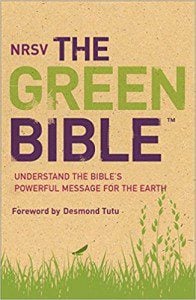
Order the Green Bible and go on a Scripture scavenger hunt for the verses in green print that highlight the special relationship between God and nature.
Three – Connect with your denomination’s environmental advocacy office or grassroots organization to amplify your voice and multiply your power to protect Creation for our children.
For example, Lutherans can connect with Lutherans Restoring Creation. Methodists have Caretakers of God’s Creation. Episcopalians can go to the Episcopal Ecological Network. Presbyterian? Try the Environmental Ministries group. Disciples of Christ-Christian Church have Green Chalice. If you’re in the United Church of Christ, try their Environmental Ministries page. Just do a Google search on your denomination and the environment, and most likely, you’ll find like-minded folks who can join you in your advocacy.
Four – Witness to your faith and make your voice heard by reminding our elected leaders that the despoiling of the ecosystems of this Earth is nothing less than the degradation of God’s Creation.
Scripture witnesses to God as creator of the Earth and all that dwells therein (Psalm 24:1). Our leaders need to know that we, as Christians, believe all of Creation is worthy of protection, especially those areas that are particularly sensitive and whose ecosystems are fragile. And especially when it comes to the health and well-being of our children.
Jeremiah warns us about cutting down the tree with its fruit. But we can make different choices to uphold what Genesis 2:15 puts forth as our role within Creation: to serve and to keep God’s garden, the Earth.
God’s presence is infused in all of Creation.
So let’s take our children into God’s outdoor cathedral – into the woods, the river, the streams, the meadows, the deserts, even the backyard. Let’s show them the wonders of what God has created, and that it is God who made all this. And that it is our job to love and protect what God has created. Let’s follow Jesus’ example by taking our children into our arms, by the hand, and welcome them into this beautiful sacred world, and we do it in Jesus’ name. When we do this, we are, indeed, welcoming God.
- Need some ideas for children’s sermons for Earth Day? Click here.
- For a reflection about preaching on Earth Sunday, click here.
- Wondering how green your church is? Take this short quiz.
- For ideas on incorporating Earth-care into faith practices and preaching, try 17 Ways to be an EcoPreacher.

Leah D. Schade is the Assistant Professor of Preaching and Worship at Lexington Theological Seminary (Kentucky) and author of the book Creation-Crisis Preaching: Ecology, Theology, and the Pulpit (Chalice Press, 2015).
You can follow Leah on Twitter at @LeahSchade, and on Facebook at https://www.facebook.com/LeahDSchade/.
For more ideas to incorporate your faith and your passion for caring for Creation, visit: https://www.creationcrisispreaching.com/.


